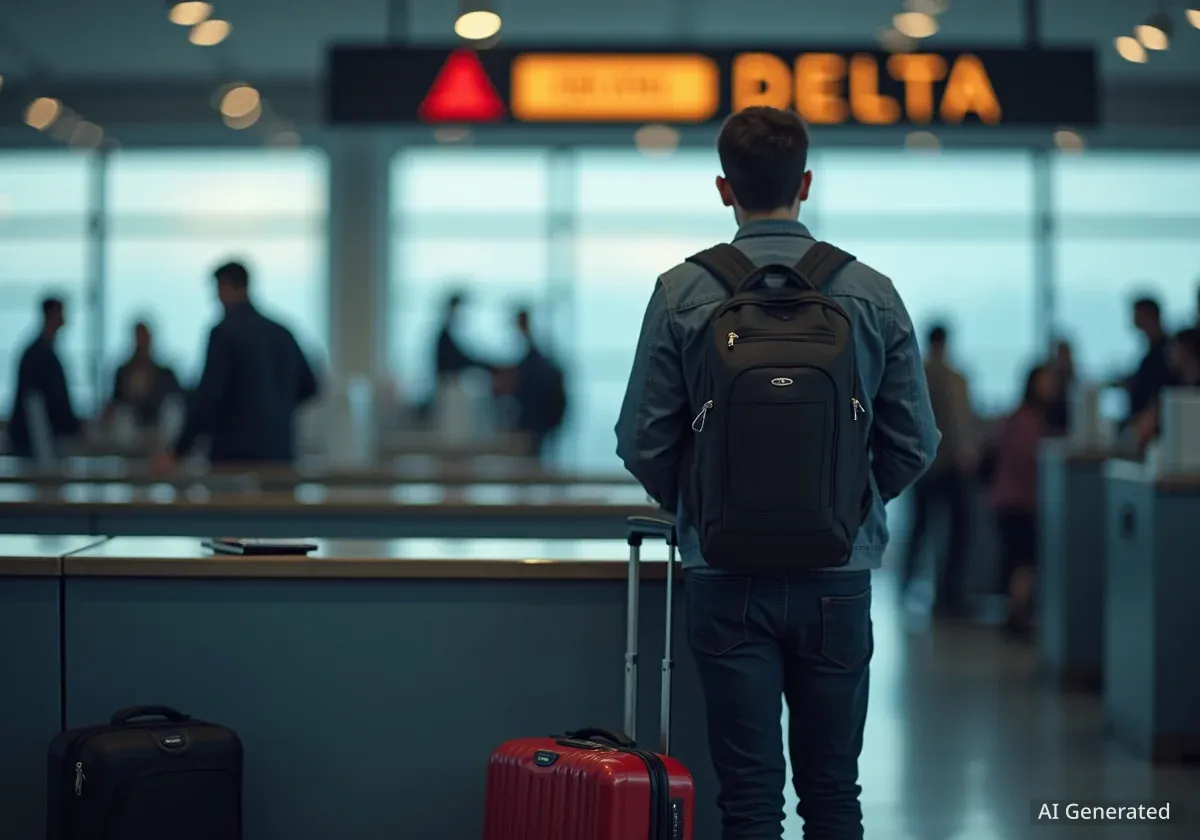Delta Air Lines is enforcing an old policy that requires some passengers to present the physical credit card used to purchase their tickets at check-in, leading to significant disruptions for international travelers. This rule, primarily intended to prevent fraud, has resulted in some customers being denied boarding and facing demands for thousands of dollars to buy new last-minute tickets.
The issue appears most frequently on flights departing from international locations, such as London Heathrow, catching many travelers off guard. Passengers who booked flights for family members or no longer possess the original card have found themselves in difficult situations, forced to find last-minute solutions or cancel their travel plans entirely.
Key Takeaways
- Delta Air Lines may require passengers to show the credit card used for booking at the airport, especially for international flights.
- Failure to present the card can result in denied boarding and the need to purchase expensive walk-up fares.
- The policy is a fraud-prevention measure but is outdated compared to modern security and payment verification methods.
- Passengers denied boarding from the UK or EU may be entitled to compensation under regulations like UK261.
- Booking through a third-party travel agency can sometimes mitigate this issue, as the agency assumes the fraud liability.
An Outdated Policy Causes Modern Problems
The practice of verifying a physical credit card at the airport was common among airlines decades ago as a primary method to combat ticket fraud. Before advanced digital verification systems, ensuring the cardholder was present was a straightforward way to confirm a legitimate purchase. However, most major airlines have since phased out this requirement in favor of more sophisticated security checks conducted during the online transaction process.
Delta continues to use this policy in certain situations, which creates confusion in an era of digital wallets, virtual card numbers, and corporate booking systems. Travelers often use different cards for various purchases, may have replaced a card since booking, or might be traveling on a ticket bought by a spouse, parent, or employer. These common scenarios directly conflict with the physical card requirement.
Why Did This Policy Exist?
In the 1990s and early 2000s, credit card fraud in the airline industry was a major concern. Without the robust online security we have today, requiring a physical card swipe or visual confirmation at check-in was one of the few effective tools airlines had to prevent fraudulent transactions. Online travel agencies (OTAs) grew in popularity partly because they took on the liability for fraud, making airlines less concerned about bookings made through them.
Passenger Experiences Reveal High Stakes
Several recent incidents highlight the severe consequences of this policy for unsuspecting travelers. In one case, passengers attempting to check in for a flight from London Heathrow to Seattle were unable to use the airport kiosk. When they approached a Delta agent, they were told they could not board without presenting the credit card used for the booking, which they did not have with them.
The travelers were presented with two options: miss their flight home or purchase new one-way tickets on the spot for a staggering $6,000. In a desperate attempt to resolve the issue, they contacted a neighbor back in Seattle. At 3 a.m. local time, the neighbor had to enter their home to find the credit card and send photographs of it. Only after receiving these images did the Delta staff allow the passengers to check in.
Cost of Non-Compliance: In one reported incident, the walk-up fare offered to stranded passengers was $6,000 for a one-way flight from London to Seattle.
Another traveler reported a similar problem after purchasing tickets for their parents and child. At the airport, the family was refused check-in because they did not have the purchaser's credit card. The airline's proposed solution was to rebook the flight for an additional $4,000.
"They told me the agent refused to check them in because they didn’t have my credit card... Now Delta wants me to reschedule the flight for $4,000 extra. I’m disgusted," one affected customer stated.
Delta's Official Stance and the Fine Print
Delta Air Lines states that its policy is designed to "safeguard against credit/debit card fraud." According to the airline's conditions of carriage, the purchaser may be required to show the payment card along with a valid photo ID. The rule is not applied universally and depends on factors like the card's billing address or the country of travel.
The airline does provide a potential workaround. If the person who purchased the ticket is not traveling, they can visit an airport ticket counter or another ticket office before the flight to have their card and ID verified in person. However, this information is not prominently displayed during the booking process, leaving many customers unaware of the requirement until it is too late.
This creates a significant challenge for:
- Family members booking travel for relatives.
- Travelers using a corporate card they do not carry.
- Customers who have since lost or replaced the original card.
- Users of virtual credit cards that do not have a physical counterpart.
Understanding Your Rights and Avoiding Issues
For passengers denied boarding on flights departing from the United Kingdom or the European Union, specific consumer protection regulations may apply. UK261 and EU261 rules mandate that airlines provide compensation to passengers who are involuntarily denied boarding, unless the refusal is due to reasons related to health, safety, or inadequate travel documentation.
Legal experts argue that a payment card is not a travel document like a passport or visa. Therefore, an airline refusing to transport a passenger solely for not presenting the purchase card could be liable for compensation. This typically ranges from £260 to £520 (€250 to €600) per person, depending on the flight distance and the length of the delay in getting to the final destination.
To avoid this situation, travelers flying with Delta, especially from international airports, should consider the following steps:
- Carry the Card: Always bring the credit card used to book your flight with you to the airport.
- Verify in Advance: If you booked for someone else, visit a Delta ticket office with your card and ID before their travel date to have the reservation validated.
- Use a Travel Agency: Booking through an online travel agency (OTA) can sometimes shift the fraud liability from the airline to the agency, making a physical card check less likely.
- Take Photos: As a last resort, having clear photos of the front and back of your credit cards stored securely on your phone might be accepted, as it was in one of the reported cases.
While Delta's policy is intended to prevent fraud, its inconsistent enforcement and outdated nature are causing significant financial and emotional stress for passengers. Until the airline modernizes its verification processes, travelers should remain aware of this rule to ensure their journey is not disrupted.





